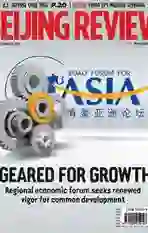REVVING A NEW ENGINE
2014-05-09ByDengYaqing
By+Deng+Yaqing
Every April, thousands of govern- ment leaders, business magnates and world-famous scholars gather at Boao, a small town that was once a fishing and agricultural village, to attend the Boao Forum for Asia Annual Conference (BFA), discussing pressing global and regional issues in white tent-style halls with a tropical pacific flavor.
With the theme of Asias New Future: Identifying New Growth Drivers, the 2014 conference included 60 panel discussions, with an emphasis on reform, innovation and sustainable development.
The speedy growth of Asian countries and emerging countries over the past few years has largely been attributed to globalization and industrial relocation. Yet, most Asian economies, especially China, seem to have been losing steam in their economic growth.
Uncertainties and destabilizing factors in the world are increasing, and the spillovers of the international financial crisis are still affecting Asia, said Chinese Premier Li Keqiang at the opening ceremony of the BFA annual conference held on April 10.
Meanwhile, some Asian countries have been crippled by economic slowdown, rising inflation, capital withdrawal and currency depreciation. Pessimistic views about the prospects of emerging economies have resurfaced, Li said. To sustain its development momentum under the new conditions, Asia needs to find a fresh source of development drivers.
China will make efforts in deepening reform, adjusting economic structure and improving peoples livelihood to seek new growth engines, said the premier.
Source of growth
As population dividend and cost advantage gradually fade away, and external demand from the West remains fragile, Chinas investmentand-export-led growth model has hit the rocks.
In 2013, Chinas gross domestic product(GDP) was a mere 7.7 percent, the lowest level since 1999, bidding a farewell to the explosive economic expansion to which the country has become accustomed. “Its predictable,” said Martin Jacques, an economic commentator from the University of Cambridge, arguing that China invested much more in its economy than the United States in proportion to its GDP.
After years of rapid economic expansion, China is now focused more on ensuring steady economic development, adjusting the structure of the Chinese economy and advancing reform, rather than blindly pursuing high-speed GDP growth.endprint
